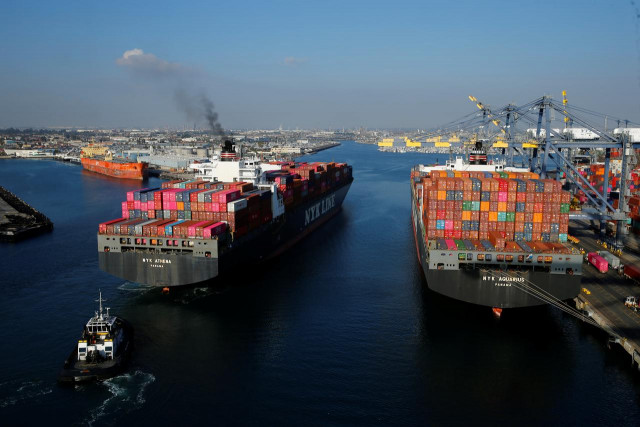Trade and economic warfare: how ready are we?
Economics has taken over foreign, domestic policy, is used as weapon to wage war

PHOTO: REUTERS
Well, it looks like China has mastered this art while keeping trade war with the US in focus.
Since the day the US kicked off the trade war by threatening to raise tariffs on Chinese goods imports, the counter-measures initiated by China has hit the Trump administration and damaged its traditional vote bank the most ie the farm economy.
The political pressure has led to a recent truce when the US hinted at delaying additional tariffs and China agreed to resume agricultural product imports from the US such as soybean and corn.
It seems that tensions have eased for now but the International Monetary Fund (IMF) has warned that this trade war can cause a dent of $700 billion to the global economy. The recent economic growth rate of 6.1% reported by China is the lowest in the past three decades, which points to further slowdown.
Clearly, economics has taken over everything including politics, foreign policy, domestic policy and it is being used as a weapon to wage war.
Prime Minister Imran Khan pointed out in his speech at the UN General Assembly about a month ago that instead of reciprocating Pakistan’s goodwill gesture of releasing the Indian pilot, the Indian government stepped up its efforts to get Pakistan blacklisted through the Financial Action Task Force (FATF).
While Pakistan was busy securing its borders from the emerging threat of war on the eastern front, India was preparing to strike Pakistan hard on the economic front.
For the past few weeks, the Indian media has been screaming at the top of its lungs to destabilise Pakistan economically and financially by influencing the FATF to blacklist Pakistan.
However, as per the broad-based consensus and contrary to India’s wish, the FATF has decided to keep Pakistan in the grey list till February 2020.
Now that Pakistan has managed to snooze the FATF alarm for a while, it needs to do some introspection to understand how the country has got into this mess and what are its weaknesses and faults which its enemies can use to wage war against it.
Loophole
Besides the FATF fiasco, there was another major loophole that appeared when the country almost averted a crisis-like situation in the healthcare sector during the post-Pulwama trade suspension.
The fact that over 50% of raw material used by the local pharmaceutical industry was imported from India could have easily resulted in drug prices skyrocketing.
Luckily, Indian companies were eager to sell the raw material provided they were paid timely and Pakistan’s government removed the ban on import of pharmaceutical raw material and even some vaccines and life-saving drugs.
This must have set off alarm bells in the power corridors because situations like these can easily trigger a tsunami of social unrest.
In the past, active pharmaceutical ingredients (APIs) and excipients were manufactured mainly in Europe and America and were imported by many countries including India to be used as raw material.
However, business-friendly incentives from the Indian government prompted these companies to shift production facilities to India as a result of which India managed to achieve import substitution and its pharmaceutical exports crossed $19.2 billion. The situation is not limited to just the pharmaceutical sector, Pakistan’s industrial sector depends heavily on imports, which is vulnerable considering the fragile exchange rate and ballooning trade deficit.
Hence, meticulous planning in the second phase of CPEC is critical for developing Special Economic Zones (SEZs) in order to focus mainly on increasing exports and achieving import substitution. We are definitely ready to counter any threat to our territorial integrity but are we ready to confront any emerging threat to our financial and economic sovereignty.
The writer is a financial market enthusiast and attached to Pakistan’s stocks, commodities and emerging technology
Published in The Express Tribune, October 21st, 2019.
Like Business on Facebook, follow @TribuneBiz on Twitter to stay informed and join in the conversation.



















COMMENTS
Comments are moderated and generally will be posted if they are on-topic and not abusive.
For more information, please see our Comments FAQ